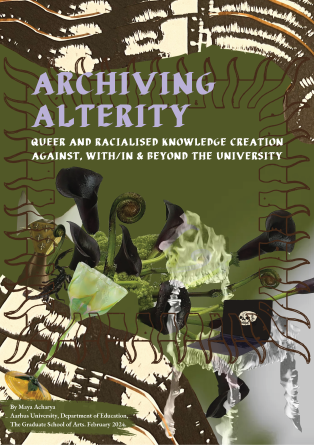Archiving Alterity: Queer and Racialised Knowledge Creation Against, With/In and Beyond The University
Synopsis
This project focuses on queer and racially minoritised students in London and how they engage in carving out spaces of antiracist resistance within and beyond the university. My curiosity is led by how students collaboratively envision and practice knowledge creation and the possibilities of these practices in striving for more socially just worlds. I explore this through the lens of (an)archiving.
Learning from decolonial, feminist, queer-of-colour and abolitionist thinkers, organisers and scholars, including those participating in this project, I reflect on the methodological and theoretical possibilities of collaborative and arts-based approaches to reconfigure antiracist resistance beyond opposition and towards what I call alterity. In doing so, I also describe the journey, content and writing of this thesis as entangled with questions of knowledge and power, and my attempt to disrupt what Eve Tuck refers to as “damage-centred models of research” (2009) through enactions of epistemic opacity.
The thesis consists of three articles that look into collective archiving practices in different ways. The first is a co-authored piece with Gabriella Muasya and describes the making of an audiovisual archive as well as our concept of sensible ruptures which is rooted in affective, sensory and embodied ways of knowing. The other two are based on creative, arts-based workshops with queer and racially minoritised students/collectives in London, and explore practices of knowledge and space-making through the concepts of mess (Manalansan 2014) and radical care (Kawehipuaakahaopulani Hobart & Kneese 2020) respectively. These three anchors – rupture, mess and care – are ways of envisioning and broadening understandings of resistance as not limited to outward activism, tangible outcomes or (only) opposition to the oppressions of higher education but encompassing affective, relational and processual modalities of creative expression.
This ethnographic study contributes to the field of higher education by placing the experiences and resistances of minoritised individuals at the forefront. In doing so, I approach the university as connected to movements and struggles beyond its physical bounds, and resistance to its oppressions through transient, everyday and affective moments of mutual affirmation that arise in doing and desiring collectively.
Thinking through the epistemic potential of zine-making and DIY practices, this study is especially inspired by creative and speculative approaches to knowledge creation (Crawley 2018, Hartman 2019, Olufemi 2021, Gopinath 2018) in its argument for the desiring, decolonial possibilities of these practices as ways of both expanding notions of the archive and disrupting dominant knowledge paradigms in academia. Alteric archival practices, I suggest, are oriented to social change beyond colonial systems and logics; they constitute the unwieldy and creative work of envisioning life-affirming worlds; of accumulating possibility through gestures, relations and practices.

